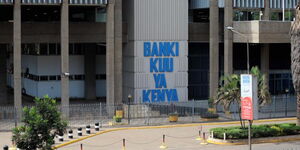President William Ruto's government, on Friday, February 3, announced the closure of 67 private and public limited companies.
Registrar of Companies, Joyce Koech, announced the closure in a Gazette Notice dated January 31, 2023.
"Pursuant to Section 897 (4) of the Companies Act, it is notified for the general information of the public that the following companies are dissolved," Koech noted.
Koech also explained that the 67 companies' legal attributions will no longer be listed in government records like the rest of the businesses.
"Their names have been struck off the Register of Companies, with effect from the date of publication of this notice," Registrar of Companies Koech noted.
The sixty-seven companies were officially deregistered by the Registrar of Companies based on terms of insolvency as stipulated in the Kenyan Insolvency Act 2015, and the duties of administrators appointed under the Act.
The introduction of the Kenyan Insolvency Act 2015 in 2015 marked a paradigm shift from the previous requirement of insolvent companies to be wound up for the benefit of creditors.
Presently, the Act requires insolvent companies first to be administered in a bid to steer them back to profitability and the handover of control back to the directors of such companies.
As such, the sixty-seven companies that were deregistered were already considered irredeemable, and the liquidation process was employed as a last resort.
The companies shut down included Advanced Industrial Automation Limited, Anime Creations Limited, Badr Residences Limited, Black Diamond Logistics Limited C.95178 Blackgold Enterprises Limited, Caresha Healthcare Solutions Limited and Chitrali Spares and Safety Limited.
Others were Valentine and Company Limited, Dagascrap Limited, Davgat Limited, Environmental Energy Enterprises Limited and House of Decker Limit, among others.
Kenyan Insolvency Act 2015 defines the terms for liquidators, administrators and bankruptcy trustees who are collectively known as Insolvency Practitioners.
The dissolution of the companies automatically led to ripple effects in the economy as many employees lost their jobs.
The Act denotes that only a qualified insolvency practitioner may be appointed in any of the capacities mentioned above.
However, the requirements for an insolvency practitioner do not necessarily apply to Official Receivers. In the previous laws, a company was allowed to wind up immediately after it became insolvent.
However, Kenyan Insolvency Act 2015 provides for procedures to ensure that the company is returned to profitable trading by way of the appointment of administrators and not necessarily to engage in the sale and realisation of its assets as a primary option.
Difference Between Insolvency and Bankruptcy
Insolvency is a financial state where a company or person cannot meet debt payments on time whereas bankruptcy is a legal process that happens when the individual declares he or she can no longer pay back his or her debts to creditors.
"Although filing for bankruptcy is a possible resolution for insolvency, this type of situation does not automatically lead to bankruptcy.
"Depending on your circumstances, you may be able to address your insolvency by other means, such as making a consumer proposal or taking out a debt consolidation loan," MNP Finance explained.
The Kenyan Insolvency Act 2015 defines insolvency s a financial state whereas bankruptcy is a legal declaration and process.
The Law also provides options to consider before a person or company resorts to bankruptcy, in which, a Licensed Insolvency Trustee will be assigned to liquidate the company assets, contact creditors, and investigate every possible affair.
Under the Kenyan Insolvency Act 2015, a company is deemed unable to pay its debts if it fails to pay a debt of Ksh100,000 or more after 21 days of a written demand being served upon it.
A company that fails to pay debts may fall under the three legal regimes for insolvency which include Administration of Insolvent Companies, Company Voluntary Arrangements and Liquidation of Companies.
Under Liquidation by the Court, the High Court of Kenya will maintain the jurisdiction for supervising the liquidation of a company.
With the unemployment rate rising in Kenya, graduates have turned to online jobs from international companies and foreigners.
Others are often seen with placards begging for jobs on the streets. On February 2, Kirui Cheruiyot, 32, received over 50 job offers after his plight was highlighted by Kenyans.co.ke.
Kirui, a graduate of Jomo Kenyatta University of Agriculture and Technology (JKUAT), roamed around Nairobi seeking employment.
In response to the plight of unemployment, the Kenya Kwanza government promised to establish a National Start-up Fund to facilitate self-employment among youth.
President William Ruto also pledged a one hundred thousand-kilometer digital super highway that will spur economic growth in the country.












